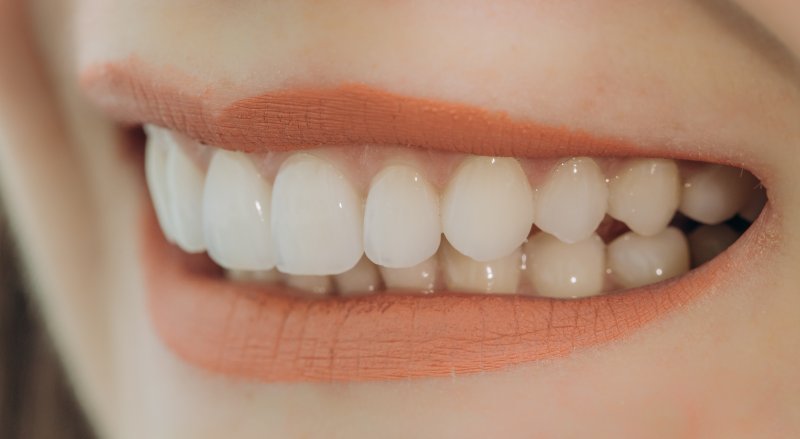
One of the great things about porcelain veneers in Denton is the fact that they do not becomes stained nearly as quickly as your natural tooth enamel. This is because the material that veneers are made from are not porous, like the natural surface of your teeth. However, they aren’t 100% resistant to discoloration over longer periods of time. If you are looking to brighten up your veneers, the process is a bit different from regular teeth whitening. A cosmetic dentist in Denton explains what your options are.
How Do Porcelain Veneers Become Discolored?
As previously stated, veneers are made out of a stain-resistant material and therefore do not become discolored as easily as your regular tooth enamel. However, surface stains can still develop, especially if you like to enjoy highly pigmented foods and drinks, like tea, red wine, coffee, and berries. Tobacco products can also cause yellowing to occur over time.
How Can Porcelain Veneers Be Whitened?
If you notice discoloration on your natural teeth, you may go to your dental office for professional whitening or invest in an over-the-counter whitening kit. While this can be effective for removing surface stains from your natural teeth, this isn’t the best way to go about whitening your veneers. The material that your veneers are made of does not tend to respond well to this type of whitening. If you want to have them brightened up, this is something you need to discuss with your dentist.
Even though porcelain veneers cannot be whitened, your dentist may still be able to remove some surface discoloration with a professional cleaning. If your veneers have become very discolored, you may want to have them replaced completely to get the results that you are looking for.
How Do You Prevent Discoloration of Your Veneers?
The most important and effective thing that you can do to prevent discoloration is to maintain excellent oral hygiene. This means brushing and flossing after you eat. It may be tempting to use a whitening toothpaste, but this could be too abrasive for your veneers. It is better to use a regular fluoridated toothpaste that is approved by the American Dental Association (ADA).
When it comes to your diet, you should be careful to avoid foods that typically cause staining, like curry, jam, soy sauce, tomatoes, coffee, tea, berries, and red wine. When you are eating hard foods, it is important that you are extra careful not to damage your veneers. Acidic foods like hot sauce and lemon juice can cause damage as well. By watching what you eat, you can give your veneers a better chance of surviving longer.
Even though veneers don’t stain as easily as your natural teeth, you still need to take steps to protect them. This way, you can enjoy having a bright, white smile for many years to come!
About the Author
Dr. Todd Balington earned his Doctor of Dental Medicine from the Nova Southeastern University College of Dental Medicine and has been working in the field for more than a decade. He offers numerous cosmetic services so you can get everything you need in one location. For more information on porcelain veneers or to schedule an appointment, visit his website or call (940) 383-3300.
